British Prime Minister Keir Starmer’s big promise during first Downing Street speech
New UK PM Keir Starmer has said it’s Britain “first” in his debut speech in the top job – but some tasks are “urgent”.
World
Don't miss out on the headlines from World. Followed categories will be added to My News.
Sir Keir Starmer has said “urgent” works need to be done to get Britain moving again on his first day as Prime Minister.
In a speech outside Downing Street, after visiting King Charles III to formally become Prime Minister, he vowed to put Britain first and “party second”.
Labour won the election by a monster amount on Friday, ending 14 years of Conservative rule..
Former Conservative PM Rishi Sunak apologised to voters outside Downing Street on Friday morning local time after his party suffered a historic defeat.
The election also saw a surge in support for the right wing anti-immigration Reform UK party led by controversial politician Nigel Farage and big increases in MPs for the centrist Liberal Democrats and the Green Party.
The biggest losers besides the Conservatives was the pro-independence Scottish National Party (SNP) which lost three quarters of its Westminster MPs.
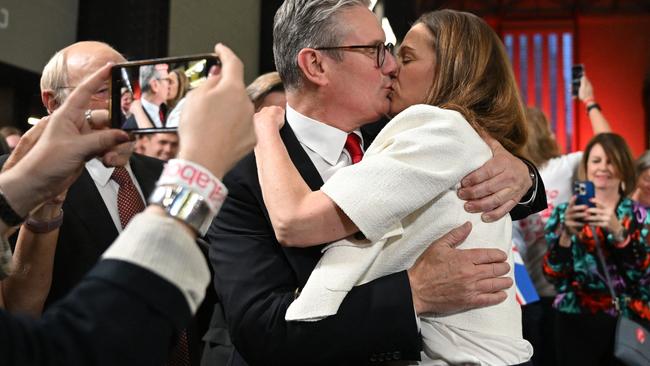
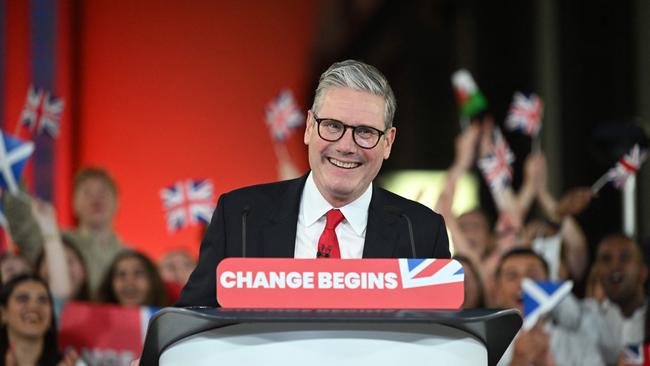
Historic appointment after 708 years
One of PM Starmer’s first action was to appoint a new Cabinet of ministers.
The most high profile appointment was also historic for Britain.
Mr Starmer appointed the UK’s first ever female Treasurer in Rachel Reeves.
Known as the Chancellor of the Exchequer in Britain, Ms Reeves, 45, will move into 11 Downing Street, next door to Mr Starmer.
Other high profile appointments include Angela Rayner as Deputy PM and former Labour leader Ed Milliband making a comeback as Energy Security minister.
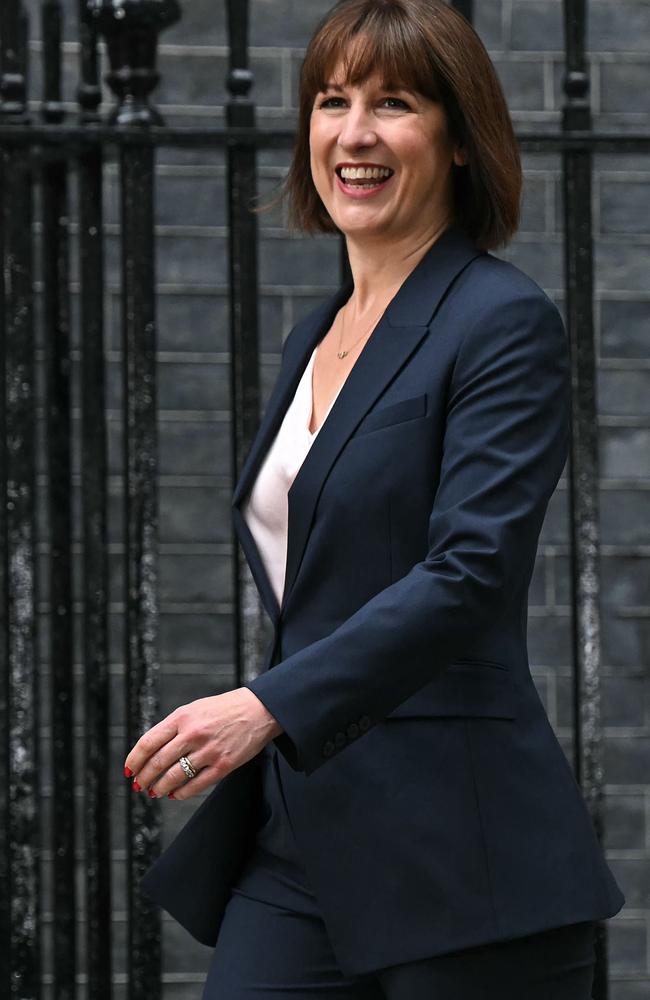
Tory bloodbath
A party needs 326 MPs to have an outright majority in the 650 member House of Commons.
Labour easily achieved this winning 412 seats, up 211 on 2019, with three constituencies left to declare.
The Tories suffered a bloodbath losing 250 seats, holding on to just 120, the worst result for any British party in modern history.
The SNP went from 48 seats to just nine as Labour MPs prevailed across Glasgow and Edinburgh.
The Liberal Democrats won 71 seats, up a stunning 63 on 2019.
In one of the biggest stories of the night, Mr Farage’s right-wing Reform party were originally forecast to win as many as 13 seats, far more than expected.
Indeed, the populist party that formerly campaigned for Brexit picked up 14 per cent of the overall vote which, by that metric, made it the third most popular party. But Reform’s vote was so spread out that in many electorates where it performed well it still came second or third and so didn’t take the seat.
Reform did manage to gain five MPs, up from zero, and still a significant political earthquake. Mr Farage will enter Westminster for the first time as the MP for Clacton in Essex – his eighth attempt to become an MP.
He even received a congratulations social media post from US presidential candidate Donald Trump.
The Green Party also did well off of a small base. It increased its MPs from just one to four, only one behind Reform.
Pro independence Sinn Fein are the biggest single party in Northern Ireland.
‘Urgent’
In his first speech as UK prime minister Keir Starmer promised to serve the British people “whether you voted Labour or not”.
“Politics can be a force for good. We will show that,” he said.
“We have changed the Labour Party, returned it to service – that is how we will govern.
“Country first, party second.”
Mr Starmer also vowed not to turn his back on people who are doing the right thing but slipping into insecurity anyway.
He talked about wealth creation, improving the National Health Service and securing the UK borders.
The Labour leader said his government would be devoted to “calm and patient rebuilding”.
“Our work is urgent and we begin it today.”
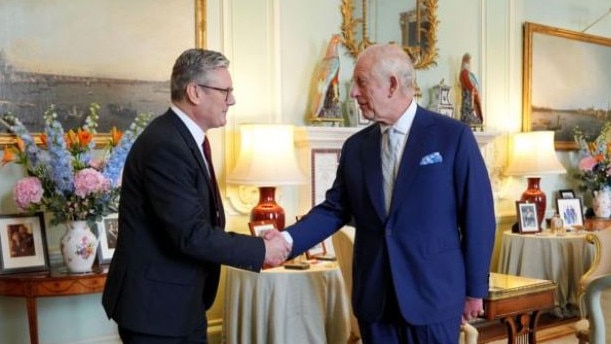
New PM meets King Charles
Keir Starmer travelled to Buckingham Palace on Friday morning (UK time) for a meeting with King Charles.
The formal audience between Mr Starmer and the King is known as “kissing hands”.
Its name originates from when prime minsters would kiss the monarch’s hands in a show of loyalty when setting up a new government in the king or queen’s name.
It is not known if modern day prime ministers have kissed the monarch’s hand as the meeting is entirely private.
Sunak visits Buckingham Palace
Rishi Sunak arrived ahead of Mr Starmer to meet with King Charles to officially tender his resignation.
The two men were completely alone as per tradition. It was a chance for the King to ask the outgoing PM any questions.

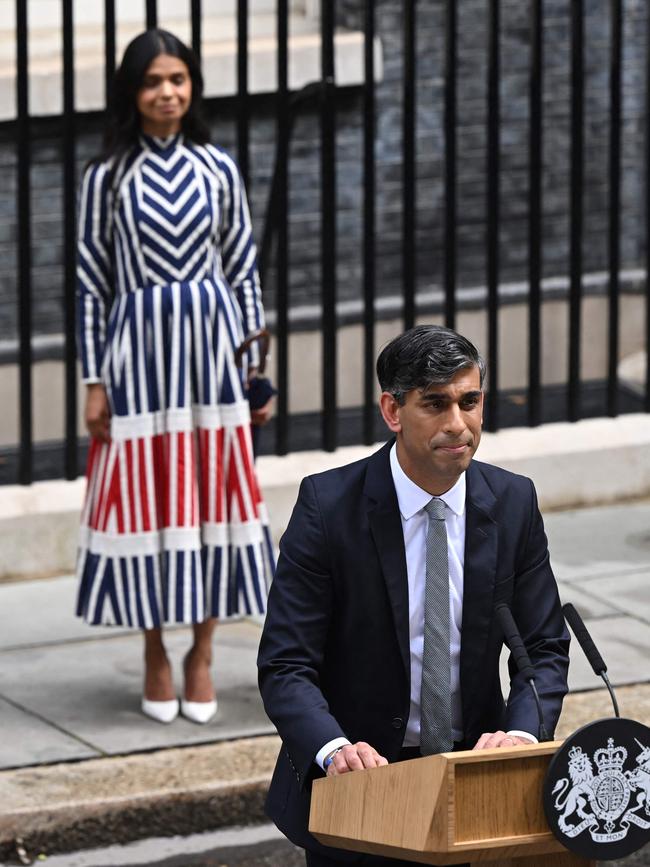
Speaking prior to his departure outside Downing Street, Mr Sunak said: “I would like to say first and foremost, I am sorry”.
“I have given this job my all.
“But you have sent a clear signal that the government of the United Kingdom must change. And yours is the only Judgement that matters. I have heard your anger, your disappointment, and I take responsibility for this loss.”
Mr Sunak also paid tribute to Mr Starmer describing him as a “decent public-spirited man who I respect”.
He added that he would step down as Conservative Party leader but not straight away.
Chancellor leaves Downing Street
Chancellor Jeremy Hunt walked out of his home at number 11 Downing Street on Friday morning accompanied by his wife, three children and their dog.
He will be replaced by the UK’s first female Treasurer Rachel Reeves.

Trump congratulates Farage
Donald Trump has congratulated Nigel Farage on winning his first ever seat – saying “Nigel loves his country”.
Mr Farage has been elected an MP for the first time as he stormed to a thumping win in Clacton on a devastating night for the Tories.
Former US President Trump said: “Congratulations to Nigel Farage on his big WIN of a parliament Seat Amid Reform UK Election Success.
Posting on social media, Mr Trump added: “Nigel is a man who truly loves his Country! DJT”
‘Lowest ever’: Conservatives get historically poor share of vote, according to forecasting
The BBC’s polling expert Sir John Curtis has released their forecast for the vote share in the election, which means what percentage of voters opted for each party.
They predict Labour will have 35 per cent of the vote, which is slightly lower than that won by Tony Blair in his third election in 2005.
Next is the Conservatives with a 24 per cent share, which makes it the lowest share of the vote won by a party with a majority in government.
Reform are then predicted to get 15 per cent, a much bigger share than had been predicted by some, with 12 per cent going to the Liberal Democrats and seven per cent to Green.
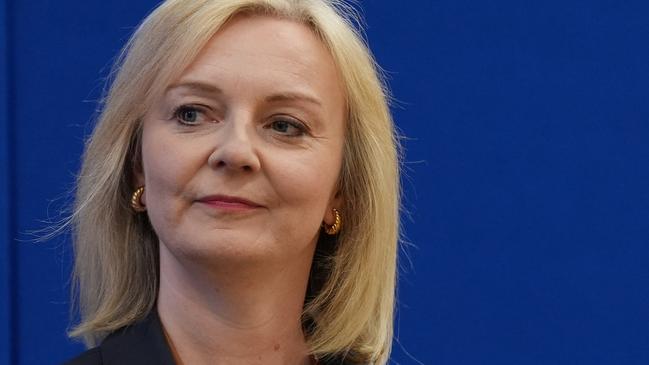
‘Disastrous’: Former PM loses her seat in huge embarrassment
Liz Truss, Britain’s shortest ever serving prime minister, has lost her seat in a major upset in what was once a safe Conservative area.
She was prime minister of the UK for just 44 days, in which time she announced a ‘mini-budget’ which tanked the pound and saw people’s mortgage rates skyrocket as a result.
In the early hours of Friday morning UK time, it was announced she had lost her seat as an MP with just a few hundreds votes between her and the winner, a Labour candidate.
It is the first time in 100 years a former PM has lost their seat, and Ms Truss refused to give a concession speech on stage afterwards, as is the usual custom.
‘Change begins now’: New UK prime minister addresses the nation
Speaking to the nation in London moments after winning the 326th seat needed to form a government, Sir Keir said the British people should “enjoy this moment”, quipping “nobody can say you haven’t waited patiently”.
“We did it! You campaigned for it, you fought for it, you voted for it, and now it has arrived,” he said.
“Change begins now. And it feels good, I have to be honest. four and a half years of wok changing the party, this is what it is for, a changed labour party, ready to serve our country, ready to restore Britain to the service of working people.
“People here and around the country have spoken and they’re ready for change, to the politics of performance, a return to politics as public service.
“The change begins right here, because this is your democracy, your community and your future.
“You have voted. It is now time for us to deliver.”
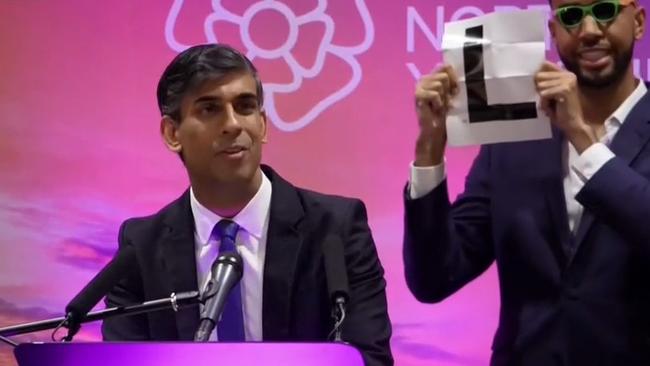
‘I am sorry’: Sunak concedes defeat
While he comfortably held onto his seat, a downcast Mr Sunak conceded defeat, saying he took responsibility and “I am sorry” for the loss.
“The Labour Party have won this general election and I have called Sir Keir Starmer to congratulate him,” Mr Sunak said.
As Mr Sunak spoke, Niko Omilana, a YouTuber and candidate in the seat who drew in just 160 votes, stood behind him holding a piece of paper with the letter “L”.
“Today, power will change hands in a peaceful process with goodwill on our side,” Mr Sunak said.
“I will now head down to London, where I will say more about tonight’s result, before I leave the job as Prime Minister, to which I have given my all.”

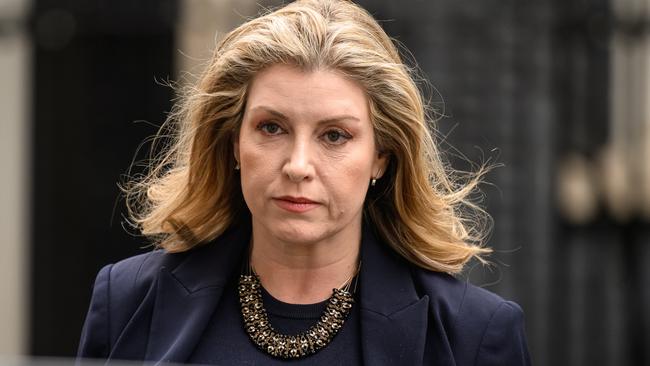
House leader gone
Another massive blow to the Conservatives — Leader of the House of Commons Penny Mordaunt has lost her seat of Portsmouth North to Labour.
“To anyone who is disappointed, democracy is never wrong,” she said in her concession.
Major Tory scalps are now rolling in by the minute, with Ms Mordaunt joining former Deputy PM Therese Coffey, Culture Secretary Lucy Frazer, Veterans Minister Johnny Mercer and Education Secretary Gilligan Keegan, who all lost their seats.
Other big losses earlier included Defence Secretary Grant Shapps and Justice Secretary Alex Chalk.

Five for Reform
Reform has picked up five seats overall.
Party chairman Richard Tice won Boston and Skegness while Rupert Lowe earlier picked up Great Yarmouth, both in England’s east.
Sky News noted Boston had the biggest Brexit vote in the 2016 referendum with more than 75 per cent voting to leave, while resort town Skegness has recently been at the centre of anti-immigration anger over the use of local hotels to house asylum seekers.
Mr Farage took Clacton in eastern England, while Lee Anderson held onto Ashfield, in Nottinghamshire in the English East Midlands. He had been a Tory MP but by this election stood for Reform.
On Friday afternoon in the UK, James McMurdock won South Basildon and East Thurrock, in Essex, east of London, by 98 votes to make it five for Reform.
Interestingly, four of Reform’s five wins are on the English coast and three are centred on seaside resorts which are far less popular now many Brits holiday overseas.
Revised prediction
As the declarations come thick and fast, the BBC continues to revise its official predictions, which now paint a slightly less dire picture for the Conservatives and a worse result for Reform than initial exit polls suggested.
The BBC now sees Labour with 405 seats, Conservatives with 154, Liberal Democrats with 56, the SNP with six and Reform with just four.

Nigel Farage elected to parliament
Reform UK leader Nigel Farage has officially been elected to parliament on his eighth attempt after three decades of trying.
Mr Farage has picked up the seat of Clacton, Essex from the Conservatives, marking Reform’s second win of the night.
“It is four weeks and three days since I decided to come out of retirement and throw my hat in the ring,” he told supporters.
“I think what Reform UK has achieved in those few short weeks is truly extraordinary. Given that we had no money, no branch structure, virtually nothing across the country, we are going to come second in hundreds of constituencies.”
Mr Farage said he did not know how many seats Reform would ultimately win but “to have done this in such a short space of time says something very fundamental is happening”.
“It is not just disappointment with the Conservative Party — there is a massive gap on the centre-right of British politics and my job is to fill it and that is exactly what I am going to do,” he said.
“My plan is to build a mass national movement over the course of the next few years and hopefully we will get big enough to challenge the general election properly in 2029.”
Mr Farage said it was “the first step of something that is going to stun all of you” and “we are coming for Labour”.
Major Tory scalp
Defence Secretary Grant Shapps has lost his seat of Welwyn Hatfield to Labour in the highest-profile Conservative loss so far.
Mr Shapps is the second cabinet minister and the most senior member of Rishi Sunak’s government to lose their seat, after Justice Secretary Alex Chalk.
Six Tory ministers have been ousted so far.

‘They’re ready for change’
Presumptive Prime Minister Keir Starmer says the British people “have spoken and they are ready for change”.
“To end the politics of performance, a return to politics as public service,” he told supporters after being re-elected to his London seat of Holborn and St Pancras.
Mr Starmer vowed that “whether you voted for me or not, I will serve every person in this constituency”.
“The mothers I sat with who have lost children to knife crime, the pensioners who can’t get doctors appointments they desperately need, the local businesses who have struggled so hard to keep their head above water,” he said.
“I will speak out for you, have your back, fight in your corner every single day.”

Labour’s to-do list
Labour’s resurgence is a stunning turnaround from five years ago, when hard-left former leader Jeremy Corbyn took the party to its worst defeat since 1935 in an election dominated by Brexit.
Mr Starmer, 61, took over in early 2020, and set about moving the party back to the centre, making it a more electable proposition and purging infighting and anti-Semitism that lost it support.
Opinion polls have put Labour consistently 20 points ahead of the Tories for almost the past two years, giving an air of inevitability about a Labour win — the first since Tony Blair in 2005.
Mr Starmer — the working-class son of a toolmaker and a nurse — has promised “a decade of national renewal” after post-financial crash austerity measures, Brexit upheaval and a cost-of-living crisis.
But his to-do list is daunting, with economic growth anaemic, public services overstretched and underfunded due to nearly a decade-and-a-half of cuts, and households squeezed financially.
The Labour leader has also promised a return of political integrity, after a chaotic period of five Tory prime ministers, including three in four months, scandal and sleaze.
“I know that the road ahead will not be easy. There are no quick fixes, and hard choices lie ahead,” Labour’s likely finance minister, Rachel Reeves, said after being re-elected.
“We are under no illusions about the scale of the challenge that we face, or about the severity of the challenges that we will inherit from the Conservatives.”
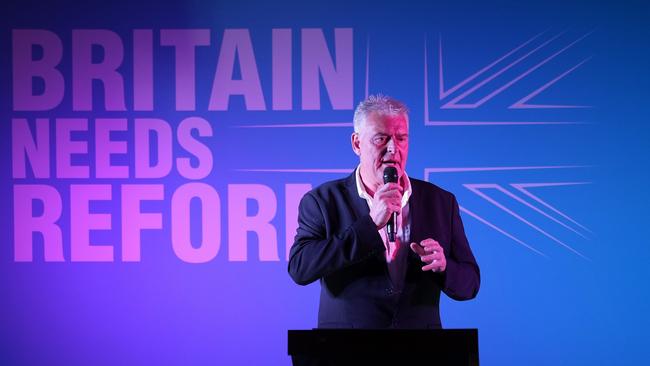
Reform picks up first seat
Nigel Farage’s Reform has won its first seat of the night.
Lee Anderson, the former deputy chairman of the Conservatives who defected earlier this year, has held on with 17,062 votes to Labour’s 11,553.
Mr Anderson was first elected in 2019 but quit the Tories after clashing with Rishi Sunak over immigration and comments about Islam.
He became an independent in February and joined Reform in March, becoming the party’s first MP.
Speaking to supporters, Mr Anderson called his Nottinghamshire constituency in England’s East Midlands, which once formed part of Labour’s “red wall” prior to the 2019 election, the “capital of common sense”.
“I want my country back and Ashfield can play their part in that,” he said.

‘Deeply painful night’
Former Conservative Education Secretary Nicky Morgan told the BBC it was a “gutting and deeply painful night to be a Tory”.
“I firmly believe that elections are won from the centre ground and we spent too long not pointing in that direction as a party,” she said.
The Tories have been heavily criticised for running one of the most disastrous campaigns in the party’s history.
Former Chancellor George Osborne said the election result was the Conservative Party’s “Waterloo” moment.
“We are going to see a load of people lose their seats, household names, or at least those who follow politics, household names,” he said.
Mr Osborne said while there were “people thinking and the polls were suggesting it could be an extinction night for the Tory party, an extinction-level event”, it would “be a huge mistake to take a lot of comfort” from the results.
“It’s going to sound odd [but] there will be a bit of a sigh of relief even though it's the worst result since 1832 when the Duke of Wellington was running the country,” he said.
“I think there will be a lot of Conservatives saying we can come back.”
‘Brighter future’
Labour’s Bridget Phillipson, set to become Education Secretary after her seat Houghton and Sunderland South was the first to declare an hour after polls closed, said in an acceptance speech that Britons had chosen a “brighter future”.
“After 14 years the British people have voted change … Labour will honour the trust that you have placed in us,” she told supporters to applause.
Six seats have been officially called so far, all for Labour, but the pace of declarations will soon speed up rapidly with the BBC predicting a massive peak at around 3.30am (1.30pm AEST).
A movement for the ‘silent majority’
Reform leader Nigel Farage has addressed a crowd of supporters at his election party in Clacton-on-Sea, celebrating the forecast exit poll result as a “massive step”.
“We’ll see what happens,” he said.
“If that’s the result, that would be a massive first step for, I’m going to call it a movement. The political party is only a part of what we’re about. This is a movement to represent ordinary folk, the silent majority.”
In an video posted to social media, Mr Farage said Reform’s second-place result in the first two electorates called showed his party would win “many, many seats”.
Mr Farage said Reform had won a higher share of the vote “than any possible prediction or projection – it’s almost unbelievable”.
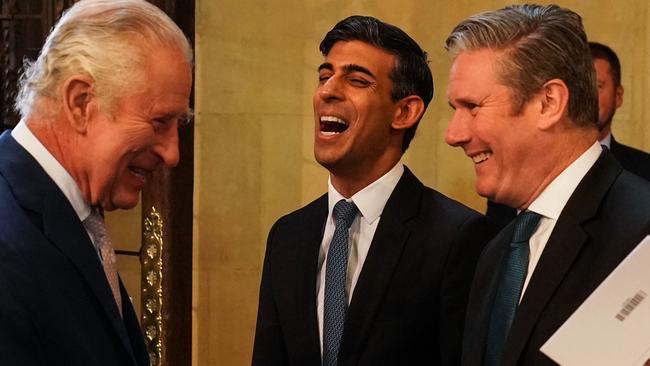
‘Worst PM ever’
Rishi Sunak has been blasted by one of his own senior party members, as bitter recriminations start over the Tories’ election wipe-out.
The anonymous former Cabinet minister, who sees their own significant majority as under threat, told The Daily Mail that Mr Sunak had “knifed” Boris Johnson and would be remembered as the “worst PM ever”.
Senior Conservatives immediately began calling for Mr Sunak’s resignation as polls closed.
First results come through
The first official vote tallies are flowing through, confirming a stunning level of support for Reform UK.
Houghton and Sunderland South, a long-held Labour seat in a historic coalmining area in northeast England, has remained with Labour’s Bridget Phillipson with 18,847 votes.
But Reform’s challenger, Sam Woods-Brass, a mental health nurse working for the NHS, drew a surprising 11,688 votes – far ahead of the Conservative candidate’s 5514 votes – in a result that is sure to please Nigel Farage.
Reform also came runner-up in the second seat of the night, the newly created Blyth and Ashington in northeast England, which was won by Labour’s Ian Lavery with 20,030 votes.
Reform picked up 10,857 votes, ahead of the Conservatives on 6121.
“Reform UK has cut through, the evidence suggests so far – and is a big part of the story tonight,” Mason said in his analysis.

‘Electoral meteor’
The centrist Liberal Democrats, which had only 11 MPs, could soar to 61 seats. But the Scottish National Party (SNP) has seen its vote crater going from 38 to just 10 seats.
The exit poll is an estimate based on surveys of voters after they had voted and they may not fully reflect the final result. The full result will come out around lunchtime in Australia.
But in what would be a huge election shock in the UK, a right wing populist political party is set to win far more seats than expected.
The anti-immigration Reform UK party, led by controversial figure and reality TV star Nigel Farage, could win as many as 13 seats
“This is an extraordinary achievement for Keir Starmer,” said former Labour minister Peter Mandelson on the BBC who added he was “gobsmacked”.
“Nobody could have imagined that this was possible.
“An electoral meteor has now struck planet earth,” he added.
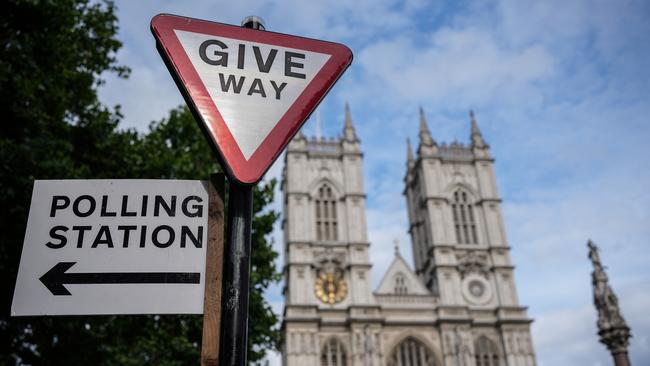
Conservative drubbing expected
At the last election in 2019, the Tories, then led by Boris Johnson, comfortably won.
That success was largely down to a promise by Mr Johnson to “get Brexit done”.
It helped the Conservatives pick up scores of traditionally Labour seats in England’s north which were called the “red wall” due to Labour’s colours being red.
But it’s been downhill since then. Mr Johnson was widely blamed for a lacklustre initial response to the Covid pandemic. Then the “partygate” scandal broke with revelations of alcohol fuelled gatherings in Downing Street during lockdown.
Mr Johnson was replaced as PM by Liz Truss who lasted just a matter of weeks before Mr Sunak took her place.
A general malaise with the Conservative Party as well as issues like the cost of living and state of the health service have harmed the party.
In addition, the right wing Reform Party has peeled huge numbers of votes from the Tories that in some areas may have allowed Labour to win.

Landslide
If Labour does win 400 plus seats it will be by reclaiming the red wall, taking scores of seats in Scotland from the SNP as well as Tory heartland electorates.
The Conservatives are also expected to also lose MPs to the centrist Liberal Democrats – who could take chunks out of the usually Tory “blue wall” of seats in prosperous towns outside London.
“The Conservative Party is virtually certain to win a lower share of the vote than at any past general election,” stated pollsters Survation.
Mr Starmer’s biggest worry was that Labour voters would be so assured of victory, they wouldn’t vote. But it seems those fears were not to be.
“To everyone who has campaigned for Labour in this election, to everyone who voted for us and put their trust in our changed Labour Party — thank you,” Mr Starmer said on social media.
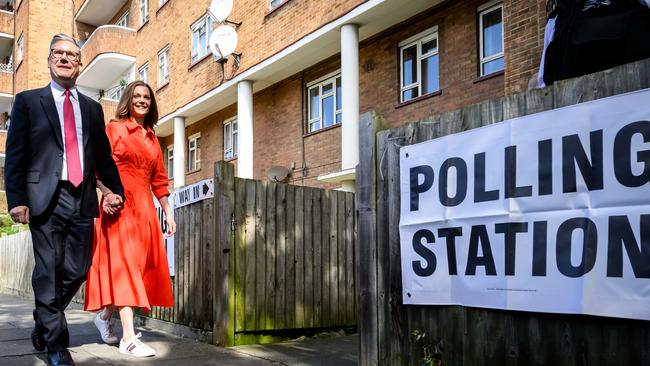
Far right surge ‘seismic’
The anti-immigration Reform UK party has no MPs at present and had been forecast to get only two seats, at most. But the exit poll now suggests he could get as many as 13 seats.
While 13 seats would be a relatively small number of MPs, Reform’s national vote share could be as high as 17 per cent.
That’s because Reform has a level of support nationwide but in only a few electorates does it rise above that of Labour or the Conservatives.
But the party is seeing this as a first step towards the next election.
“This is a huge bridgehead. This is politically seismic,” said Reform’s deputy leader Ben Habib.
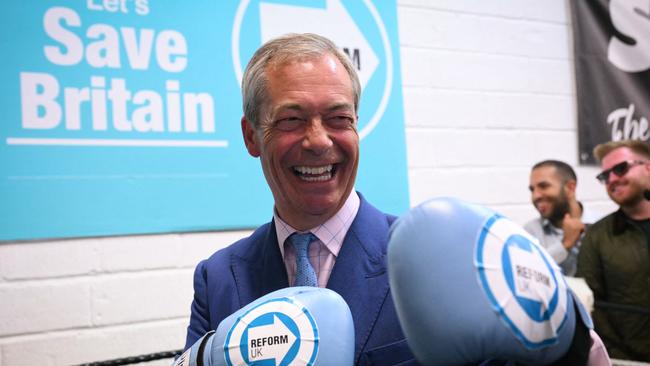
Reform ‘the real opposition’
Reform, which was born out of the anti-European Union UK Independence Party, is predicted to do so well in the popular vote it may not be far behind the Tories, as the Conservatives are also known.
After the election, some are even suggesting that Reform merge with the Conservatives and Mr Farage takes over as leader which could see him become a future candidate for prime minister. That would see the Tories swerve more to the right than they already are.
William Hague, a former Tory leader, told Times Radio the result was “catastrophic,” but he warned the party should not rebuild but going further right.
“The Conservative Party at its greatest, – as it has been over 200 years, usually the governing party of the country – because it could command the centre ground of politics, people of all walks of life, people of all age groups, and it will have to be able to do that.”

Mr Farage is already talking about how Reform intends to use this week’s election result as a springboard for more power.
“After Thursday, Reform UK can be the real opposition in parliament,” Mr Farage has said.
“We will hold Starmer to account over his plans to open Britain’s borders to even more immigration and betray Brexit by taking the knee to the EU.”

Mr Farage has been in politics for some time but his popularity was boosted after he came third on the UK version of I’m a Celebrity … Get Me Out of Here! in December. It helped introduce him to more Brits and soften his image.
Reform’s messaging has been dented by comments by Mr Farage that were seen to pander to Russian President Vladimir Putin and allegations of racism and misogyny from some of Reform’s candidates and staff.
Mr Farage also has plenty of critics such as the woman in Clacton who threw a milkshake over him.
But thick vanilla drinks may not stop its rise.
— with The Sun and AFP
More Coverage
Originally published as British Prime Minister Keir Starmer’s big promise during first Downing Street speech




